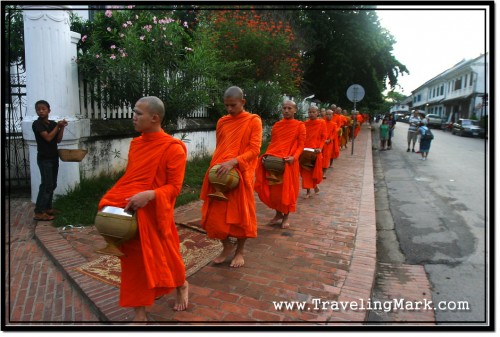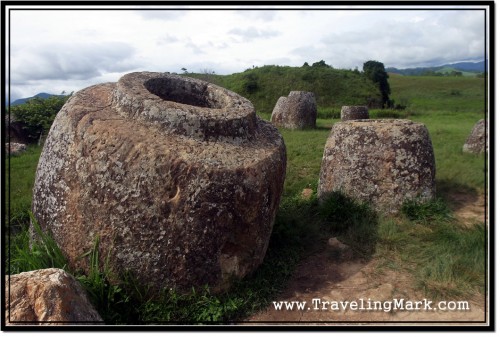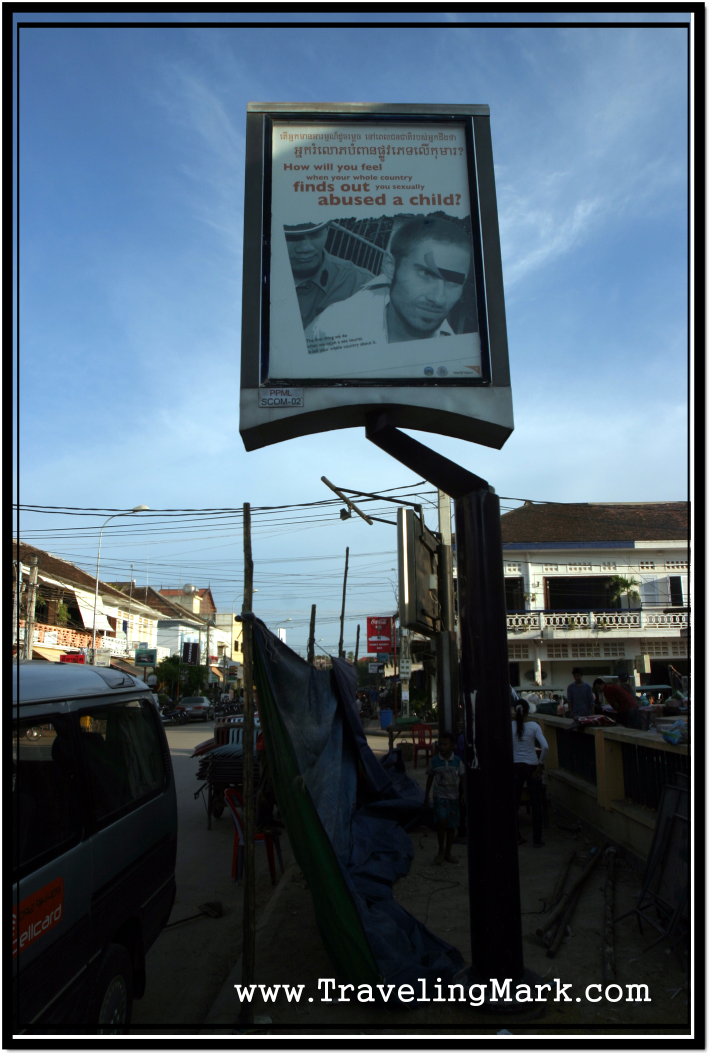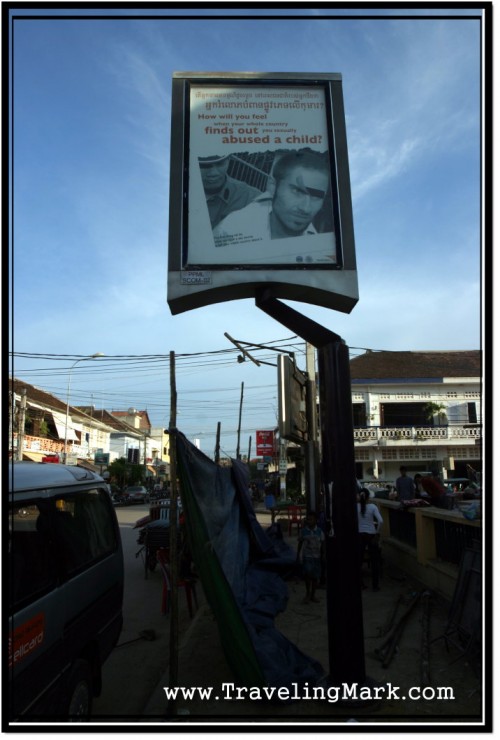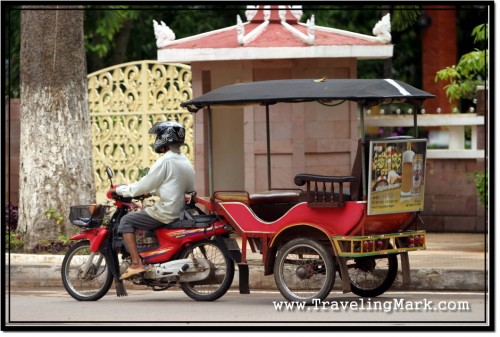Fear of Reality is a phenomenon that was completely unknown to me until I’ve started this blog. As someone who stands with his feet firmly on the ground and doesn’t float in the world of fantasy, starting a blog that doesn’t showcase the world of travel through the rose colored sunglasses was an eye opening experience. Eye opening because the amount of hatemail I get from people who fear reality so much they jump down the throat of anyone who dares to speak openly about it was so overwhelming, it really made me think and try to come to the core of what causes the travelers be so ignorant and arrogant. The study has lead me to the discovery of fear of reality and how it affects the travelers – the very specimen of human race I’d think would get affected by it the least. The exact opposite proved to be the truth, but let’s look at it nicely from the start:

Fear of Reality and Its Effects on Travelers
Most people associate the names of exotic countries with pictures of a tropical paradise. Most people who visit those countries return back home telling everyone of wonderful, smiling people who were killing themselves over who will be the first to help a lost foreigner with any advice they may need. And most of those people will stick by their notion that locals from that country are the nicest people in the universe to a point that if someone dares to speak otherwise, they’ll be right there responding without hesitation with the most colorful verbal assaults their brains can produce.
Fact be told, the “most people” I speak of in the above paragraph are the most clueless members of the society who wouldn’t know a rip off artist if it came at them with a signboard above their head and hit them square in the face. As a result, even though they’d become victims of mind games played on them by greedy locals who specialize in taking advantage of naive tourists, not only will they not realize that that was the case, they will be so taken aback by the faux-friendship they had just forged and the fake smile they had witnessed, they won’t even admit for a second that they were ripped off and will assault anyone who dares to clarify for them that ripped off they truly had been.
I knew this was happening right off the bat, I just couldn’t come to the core of why. How could a fake smile hypnotize an otherwise intelligent person to a point that they abandon all common sense and set on a path of complete idiocy? How could someone be so gullible that they would thank a thief for robbing them and stay friends with them so that next time they’re around, they’d offer themselves up for him again?
Fear of Reality Does Exist
At this stage I still didn’t know a darn thing about fear of reality, I was just actively pursuing the truth behind the utter naivety of vast majority of travelers. It all started to come together after I took a trip to Pattaya, Thailand – the largest brothel in the world where an excess of 20,000 hookers operate on any given day of the year, with the number growing by 25% – 50% during the high season months.
Walking around with my eyes open and wits unscathed by the unceasing calls of generally unattractive Thai girls desperate for my money, I spoke with many people on both sides of the spectrum to get a clear picture of what really goes on behind the facades played on by either party. And bit by bit I saw the fear of reality slowly take shape before my eyes.
How Harsh is Reality?
Just as I had witnessed in Cambodia where rip off artists thrive because they found out that putting a fake smile on is all it takes to rip a tourist off who would in turn thank them and recommend them to all of their friends, Thai girls also thrive on naivety of foreigners who fall for them acting as though they were their girlfriends and would continue sending them money even after their return back home not realizing that the girl wiped his taste off her mouth with disgust as soon as she was out the door and thought nothing less of him than a stupid walking ATM machine.
Whether it’s the rip off artist from Cambodia or the money hungry hooker from Thailand, at the end of the day, to them you were just a stupid foreigner who was so naive, you made an easy target and will only be a good source of laughs when they brag about your gullible self to their friends.
Thai Hookers
Despite being openly xenophobic, Thailand attracts massive number of tourists, many of whom are repeat visitors with many relocating to live in Thailand as expats. I got a chance to speak with many expats living in Thailand and even though they are aware of out of control murder rate of foreigners in Thailand (many of whom are killed out of sheer hatred of foreigners with the police hating all foreigners just as much hence supporting these murders or seeing them as justified), they still refuse to accept the notion that Thailand is a dangerous country and continue to adamantly protect Thailand’s reputation by attacking anyone who dares to speak badly about their country of choice? It took a very close look at the way Thai hookers operate to properly understand why they fear reality so much.
Like Thai men, Thai women are inherently xenophobic. They hate foreigners so genuinely it gives them shivers, but they love the money foreigners have so they put on skimpy clothes and go whoring themselves out for some of that dough. Forget all about Buddhism – when they take a whiff of the green stuff, all of the Buddhist principles they pretend to uphold get temporarily suspended (as they do when the craving to satisfy their xenophobic ways takes hold).
As a result, even though you’ll see those Thai hookers join their palms together and bow their heads in a prayer each time they see a temple or a shadow house, they forget all about it when a foreigner comes to sight. Selling their bodies for money is as normal as hatred towards foreigners. And – strangely or not – it is that fact alone that keeps drawing such a massive and steady flow of foreigners to the country.
Thailand is no longer cheap, people are not friendly and never ever smile (just look at the king of Thailand who is a reflection of his people – good luck finding one picture of him smiling). Scam is a daily happenstance and murders of foreigners more than common, though frequently ruled a suicide, a natural cause or an accident (the police is perhaps the most corrupt institution in an already corrupt country, so you can imagine how honest they are). Yet people keep coming back, bringing more and more money to fuel this xenophobic society. That’s how powerful the hooker attraction is.
Interestingly enough – Thai girls are not attractive and they are definitely not cheap. I don’t know how much hookers cost in the western countries, but I wouldn’t be surprised if they were less expensive than any of those Thai prostitutes. Yet people keep coming to Thailand for hookers, including people who have never been with a prostitute before. I tried to come to the root of this phenomenon as well and based on my research, it is because of sheer number of available hookers that can be encountered in any part of Thailand.
You see, many men fantasize about various women. While prostitutes can be had in almost any country of the world, the difference between Thailand and other countries is in the fact that virtually all Thai women are whores. As a result, if you happen to fantasize a Thai girl you casually spot, you can have her if you’re willing to pay. This is not true in the rest of the world. And this is also why many men who slept with a prostitute in Thailand had never paid for sex before and never will after.
Because when you leave Thailand, most of the women you meet will have some level of dignity in their lives so you won’t be able to just have them for money. Majority of women around the world will not sell themselves out just like that so if you happen to fantasize one who doesn’t particularly reciprocate your feelings, the fantasy will remain the fantasy and you will have to move on. But when you are in Thailand, you can turn that fantasy into reality by just shelling out an agreed upon sum of money. Because when money talks, Thai girls bother not about Buddhism or dignity. They like the green stuff and will gladly spread their thighs wide open for some.
And whether men who repeatedly come to Thailand admit it or not, this is really what attracts them back. Thai girls may not look like much, but they are always ready to go with you if you pay for it. And with so many of them offering themselves up before you could ask, you don’t even have to bother approaching them. If back home it is you who gets rejected approaching women, in Thailand it is you who does rejecting because there are so many of them approaching you, and that my friends is what drives mass tourism in Thailand.
How Thai Hookers Cast Light Into Fear of Reality
It was when I was in Pattaya – the biggest brothel in the world when I realized why people fear reality so much. Men love being constantly approached by women and asked to go out with them. But it changes nothing about these women having no dignity in their lives and craving money more than anything else. As a result, as soon as they’d collected the cash from you, they forget all about you and it’s back to hunting another victim. They would be sweet-mouthing you and act like your girlfriends – they’d do anything and say anything only to make you spend more.
Sob stories of them having hungry kids, mother in a hospital, live stock dying from a rare disease or whatever else is appropriate at the moment are commonly used to make the men feel sorry for them and spend more. The ultimate goal is to enchant the man so much, he would commit to helping this poor girl out any way he can and because many men who come to Thailand are hard working business people, when their time is up, they return home but continue supporting their new found girlfriend with funds wired to Thailand from their home country.
This is where it gets interesting. Before the man leaves Thailand, the sob stories get exaggerated to a larger than life extent and the girl presents the man with a way to stay in touch with her. It is oftentimes a mobile phone number, an email address, a facebook account or whether else has been working out for the girl the best. While the man is abroad, she keeps replying to him in a way which makes it sound as if she was his girlfriend.
Meanwhile, though – she continues whoring herself out. She’ll remain relentless until she finds another naive, gullible foreigner who eats her sob-stories with a chocolate topping and when he leaves, she will have another man to reply to as if she was his girlfriend, until he starts sending money from abroad as well, creating a new stream of workless income for the hooker.
Ultimately, she will engage several men like that, so even though each of them only sends her money every now and again, it adds up to being a solid pile of cash each month. Obviously, the men went to their home countries to work hard to make a lot of money so when their chance at another vacation time comes, they will head back to Thailand to be with their girlfriend who “loves them so much” (based on what she says when she responds to him by email).
With so many boyfriends to take care of, the girl will try to “help them” choose the best time to come to Thailand to ensure she’s available. The last thing she wants is for any of her sponsors to find out that they are not the only ones in her life so if a threat of two or more of them coming to Thailand to be with her at the same time looms up, she’d only respond affirmatively to one of them, while presenting the others with all sorts of valid reasons to postpone their trip till a later date.
As a result, when a man does come, he finds his girlfriend all dedicated to him, waiting for him as if he was her only love. This will encourage him even more and he’ll decide that he doesn’t want the girl to work as a prostitute anymore because she’s his dedicated girlfriend so next time he goes back home, he’ll commit to sending her so much money each month, she won’t have to sell herself out anymore because he’ll send her enough to look after her family (remember the sob stories?) without working as a hooker.
He leaves and she continues with her relentless pursuit to engage more and more men in the same way until eventually she gets a monthly wage from about a dozen of them. This is already enough for her to buy herself a nice car and live it up like a king. She would just respond like a girlfriend to messages from all of her boyfriend/sponsors and continue adding new sob-stories about new hardship that had befallen upon her so they could send bonuses on top of her monthly wage. And when they come over for a week or two, she spends time with them, gets them to buy her more jewellery, fragrances, clothes and whatever else her heart desires before seeing them off to wait for another one of them to come for a week or two.
In brief – these girls will pretend to love you like there’s no other man in the world, but as soon as you’re out the door, you’ll be naught more but a “walking ATM” reference when she goes to hang out with her friends to spend your money and brag about how many men living abroad who are sending her funds regularly every month she already has.
It’s a performance start to finish – just like those fake smiles from rip off artists of Cambodia many travelers won’t allow anyone to say a bad thing about. A mind game tailored to take advantage of these men, yet those men love it and keep coming back. And guess what they would do if someone suggested that their bellowed Thai girlfriend was a whore who is just taking advantage of them? They would jump that person and curse them to world’s end – just the way the self righteous protectors of the rip off artists from Cambodia do when I point out the truth about them. How awesome is that?
Fear of Reality Conclusion
To sum it up, my quest to find out why so many otherwise seemingly intelligent and/or well traveled people fail to see the truth and will not hesitate to verbally assault anyone who calls a spade a spade lead me to the discovery of Fear of Reality. While I may not be the first person to have found out about this phenomenon, it is something that I did not know existed so discovering it on my own affirmed me that I have a solid grip on reality and belong to a tiny group of people who are able to see the forest for the trees.
Fear of Reality is a type of phobia that makes people give up sound reasoning for faux feel-good experience. In other words, if you make them feel good, even if you’re only doing it to rip them off, in the end, they will still put maximum weight on the feel-good experience and will completely ignore the potentially negative part of the experience. Because they fear reality, instead of admitting it into their lives, the weak minded individuals will resort to living in a fantasy. It takes a person of exceptionally strong spirit to handle and face reality hence you’ll only find a handful of people who don’t suffer from Fear of Reality.
I’ve summed up the reasons why so many people suffer from Fear of Reality in three steps:
- Lacking Observation Talent
I’m simply shocked by how lacking most people are when it comes to basic observation talent. Let me give you an example. If you ever get a chance to visit Pattaya – the largest brothel in the world, you will likely go for a stroll down the infamous Walking Street at night. This part of Pattaya is full of a-go-go bars and seems pretty dead during the day, but booms into a massive happening when the sun goes down. Thousands of foreigners of all races slalom among touts lurking to catch unsavvy newbs with ping-pong shows offers and underprivileged locals trying to sell stuff nobody with half a brain would buy. Many of those underprivileged locals are very old, crippled women with jasmine pendants hung on their arms approaching you with a smile and a big hope in their teary eyes that you would buy one.Virtually everybody I spoke with was aware of them and felt sorry for these old women who ended up having to sell flowery things in a place like the Walking Street, Pattaya only to make a living. Yet not one tourist in Pattaya could read the real truth from their teary eyes. They are not there to make a living or to survive or for any other similar reason. They are there because they are forced to. They are captured by local mafia, beat up and forced to earn a living for the young punks who control (understand – abuse) them. Each of these women have seen way too many winters and most of them have some visible disability. None can speak a word of English or any other language past their own. They skilfully hide their swollen, bloody lips which are the result of treatment the mafia boys manage them with. They are too old and too weak to stand up for themselves and/or to escape the abuse. And no foreigners can see that. All they see is an old woman struggling to survive so she came to Pattaya. So they buy her flowers because they feel sorry for her and want to help her out not realizing that by doing that, they’re helping out the mafia. For as long as abusing old, defenceless women remains a profitable venture, the mafia punks will continue kidnapping more of them, beating them up and forcing them out on the street to utilize their poor looks to entice foreigners into spending money out of sheer compassion.
- Inability to Read Between the Lines
I think the reason I can read people so well is because I’m a photographer. I established myself as one of the world’s most celebrated nude photographers and a successful photo journalist because I was able to see what people are thinking and capture their real selves without pretence. Most people don’t seem to have this talent or don’t have it properly developed. Skilled photographers as well as traditional paint artists would also possess the same ability, but these account for less than half a percent of the population. - Ignorance and Arrogance
Most people prefer to live in a fantasy world. Reality confuses and scares them. You show them what the real life looks like and they will unleash the savage beast that dwells within them. The best way to prove it is by sending anyone to a reality news website, such as BestGore.com (WARNING!!! – extremely graphic content on that link. Do NOT click unless you’re ready to face the reality. This website does not mess around and tells it like it is – kind of like mine – which is why 99% of those visiting it WILL be offended. Don’t come back at me if you happen to be one because I have warned you. The front page which I have linked is safe, but read the warning on it carefully and click the puppy unless you’re really ready to see what the real life is about).Fear of reality is obvious from people’s reactions to being ripped off by smiling rip off artists. For as long as the rip off artist smiles and sweet talks to them, the victims will not only not perceive it as a rip off, they will actually think that they were treated like royalty and will verbally assault anyone who tries to open up their eyes and tell them the truth. The truth is the reality and they fear it. They prefer to live in a fantasy – the world without their rose colored glasses is too harsh and they refuse to accept it. If you take their rose colored glasses off, they will jump down your throat and won’t get out lightly. Good 98% of total population fear the reality and will fight to protect their fantasy world from those who stand firmly on the ground. They will always deny the possibility that they’re living in a fantasy and will continue lying to themselves no matter what.
BTW, this post was full of hard to swallow reality. Did it give you shivers reading the facts as they are? Did it perhaps enrage you or make you want to get back at me with verbal diarrhea to show me what a racist a$$hole I am? Yep, fear of reality can make people do that and if you found yourself feeling that way, know that this post is about you, whether you admit it or not.
It is not the purpose of this article to enlighten or change anyone. The sole fact that some people prefer the fantasy world to reality is a proof enough that they are lost causes and cannot be amended. People who fear reality also fear the real picture of themselves and as such are unable to look deep into their own selves to realize which side of the spectrum they fall into. Let me repeat myself one last time – reality is often too harsh to accept. If exposure to it through this article pissed you off, take it as a sign that there might be a whole wide world spread right before your feet, but you’re so focused staring at the tip of your nose, you can’t really see it.
